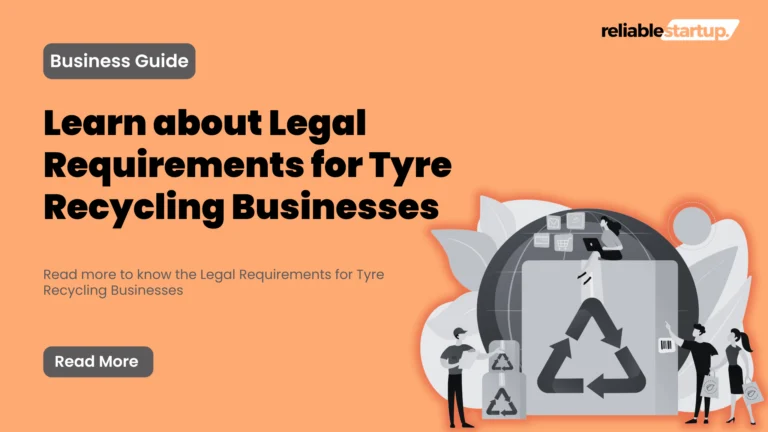20 Climate Tech Startups to Watch Before Starting Your Own
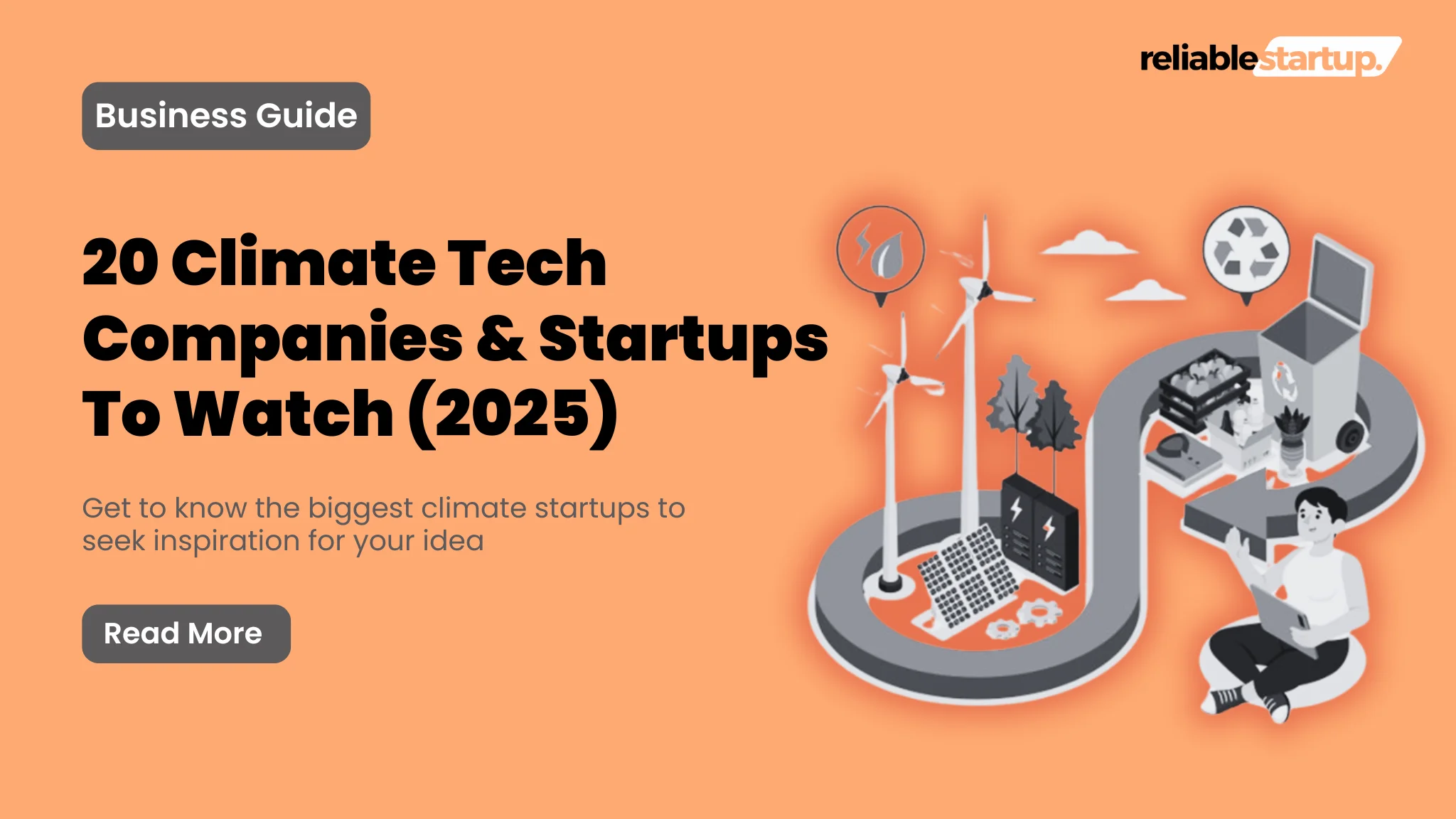
Are you looking for the best climate tech startups in 2025 to get inspiration from and start your own? Then you have landed on the right page.
Let’s be real: the climate emergency is no longer looming; it’s happening now, it’s urgent, and it’s re calibrating sectors like never before. As far as you are an entrepreneur, that can be the most significant opportunity.
Climate-focused innovating ideas are in demand more than ever.
But let’s address the elephant in the room: starting a climate tech startups can be a tiring experience.
Where do you even begin? The market is enormous, the tools are rapidly advancing, and the rewards—or risks, as the stakes may be—are international.
Here’s the good news: There isn’t any need to come up with something new out of the blue, with everything available for you and very organized.
Many of today’s most innovative startups were in the same position you were in a few years ago.
They did not shrink from dreaming big dreams, from meeting fundamental challenges, and from creating a world that was much more sustainable.
That is why we have listed 20 Climate Tech Startups To Watch in 2025 to show what can be done and to inspire you with potentially great ideas for new companies.
Well, then, coffee in hand and pencils at the ready, let’s look at those organizations that demonstrate that effectively combating climate change makes good environmental sense and sound business sense as well.
Ready to make your mark? Let’s go.
20 Top Climate Tech Startups
The following are the top 20 best climate tech startups that you can get inspiration from:
LambdAI Space
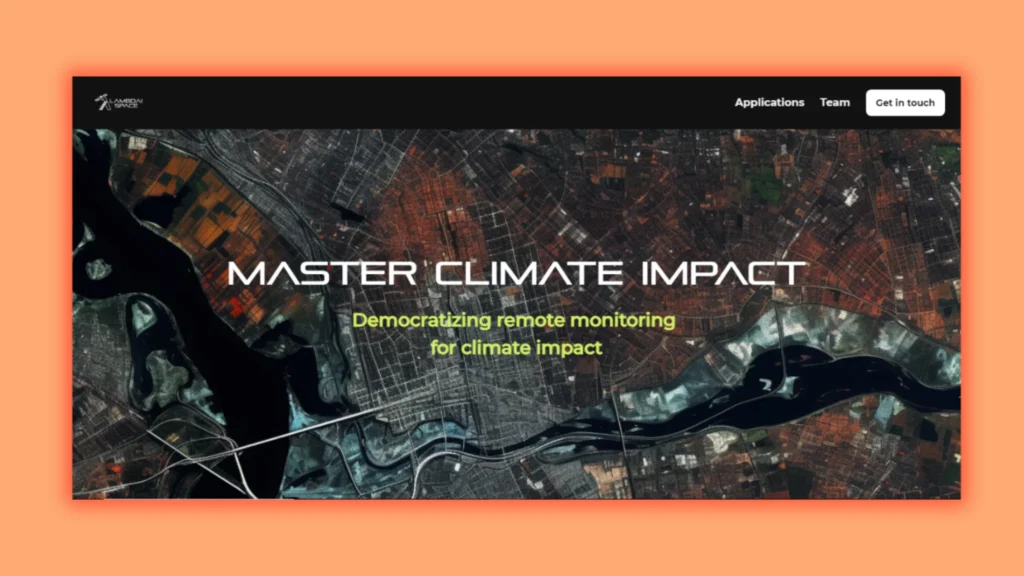
Singaporean startup LambdAI Space is an AI-propelled organization that uses sophisticated algorithms to analyze satellite perspectives of climate and climate change.
This enables business organizations to mitigate climate change impacts in advance and support sustainability.
The startup promotes an understanding of natural resource usage by employing technology that analyzes its characteristics, configuration, depletive status, and fluctuations.
Further, LambdAI Space is also progressing with asset tracking 24/7 satellite networks to access the infrastructure and resources more accurately.
Its technology provides Earth information, creating high-quality images and information for risk applications in different sectors, including farming.
CO2L Tech
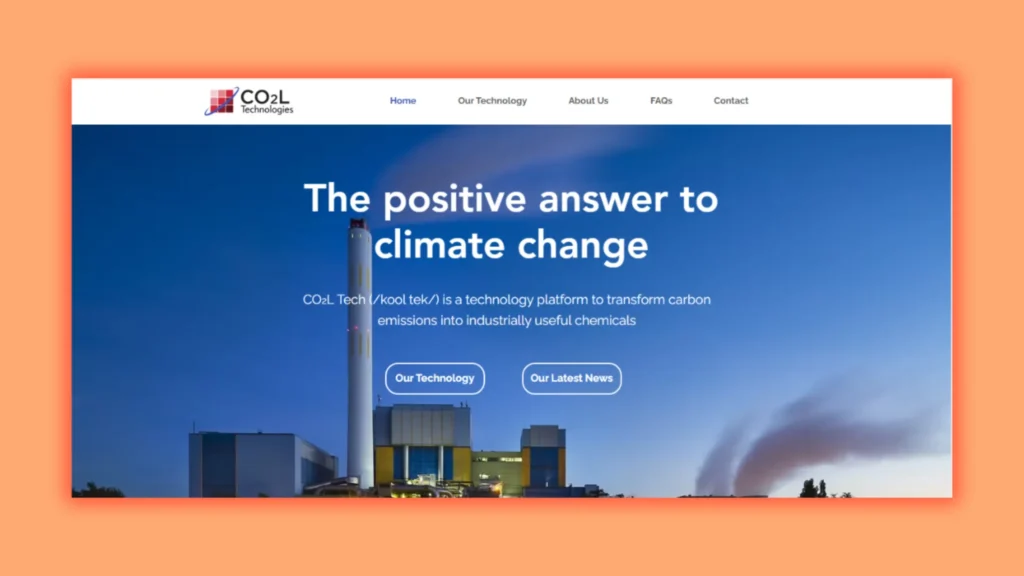
Canadian CO2L Tech is a startup that designs a marketplace that leads to the mitigation of global warming because it converts emissions into valuable industrial products.
The electrochemical CO2 Reduction (ECR) systems turn CO2 into ethylene, syngas, or formic acid.
CO2L Tech combines perfectly with currently available CO2 emission sources for the sustainability of the technology.
HeiQ AeoniQ
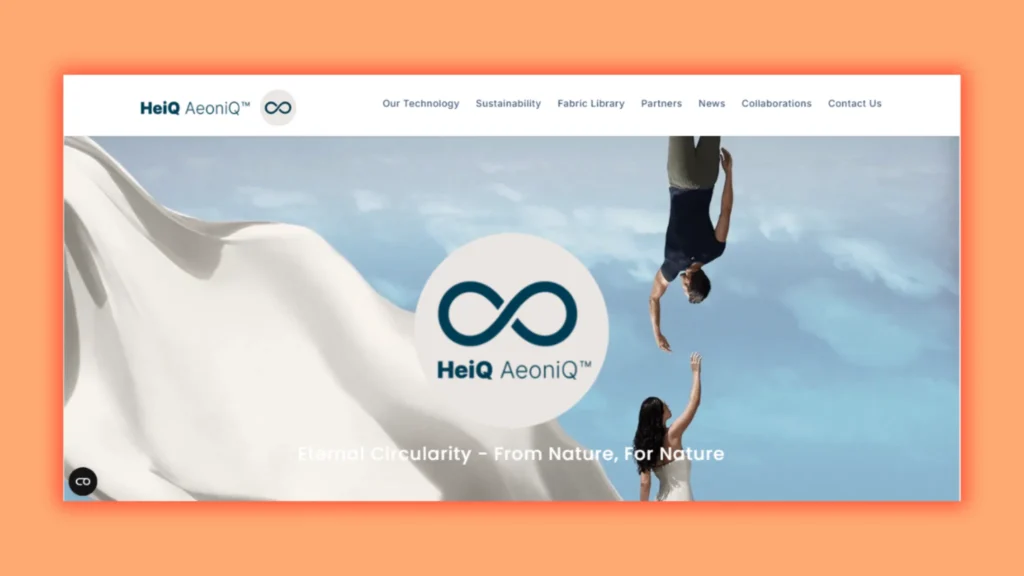
Swiss startup HeiQ AeoniQ provides a climate-positive cellulose filament yarn AeoniQ, making sustainable textile production possible.
This yarn reconditions water and emphasizes raw materials that help pull carbon eight down from the atmosphere.
AeoniQ by HeiQ employs different cellulosic materials derived from local sources. These may include cellulose, bacterial cellulose, or agricultural residues, depending on the region.
This flexibility enables the startup to mimic the properties of synthetic materials such as polyester or nylon without harming the environment.
Carbon Atlantis, Now Called Phlair
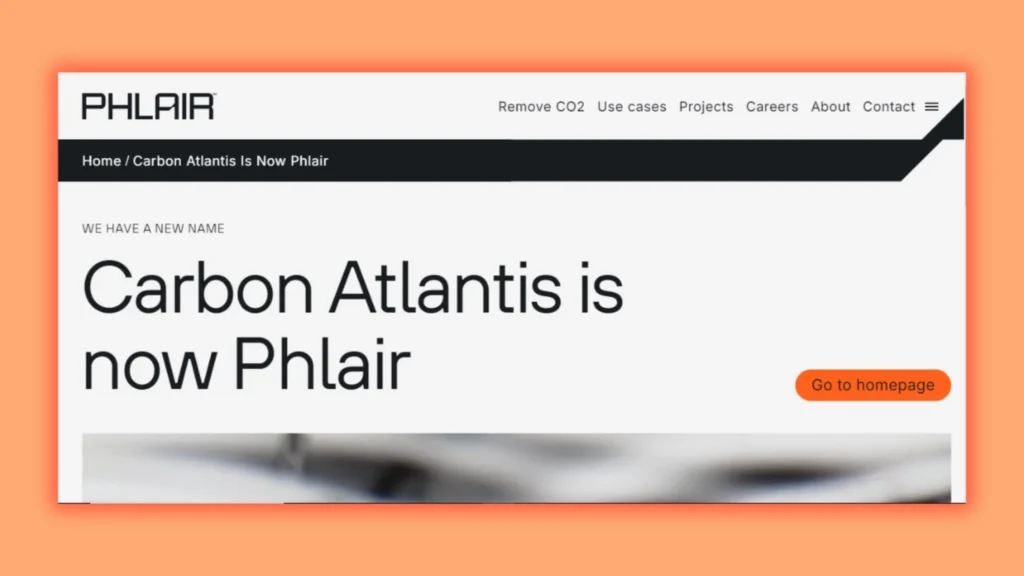
German Carbon Atlantis (Phlair) startup retains carbon dioxide dozen and is crazy virtually sectors.
This is accomplished through a proprietary method that pumps a liquid sorbent to absorb CO2 effectively.
The captured CO2 can be stored or used in carbon-neutral or harmful products, and utilization is better than storage.
This Carbon Atlantis system has distinguished itself by cost efficiency, modularity, and scalability. Combined with addressing the climate crisis at the source, these characteristics will preserve glaciers, habitats, and biodiversity.
Varaha
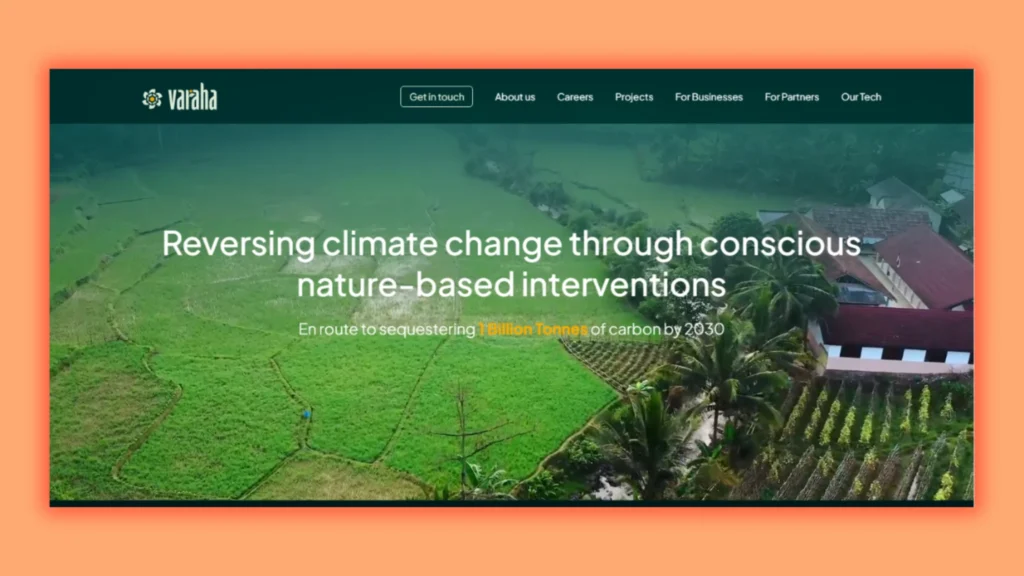
Indian start-up Varaha uses advanced remote sensing, biomass, soil modeling, and ML to scrutinize projects for carbon credit.
Its process starts through data collection from different stakeholders in developed economies; where it gathers information on the characteristics of land and agricultural practices.
These data are validated with satellite imagery, light detection and ranging (LiDAR) imaging, and other remote sensing techniques.
In addition to emission reduction and carbon sequestration, the startup’s Carbon Quantification Tool (CQT) determines the carbon credits.
These high-quality carbon credits are entered into its blockchain-based SaaS application and released to global carbon markets, along with funds to support smallholders.
Varaha also supports the origination of new carbon-neutral projects and promotes the creation/repair of carbon-neutral natural intercessions in the developing world.
Carbon Twist
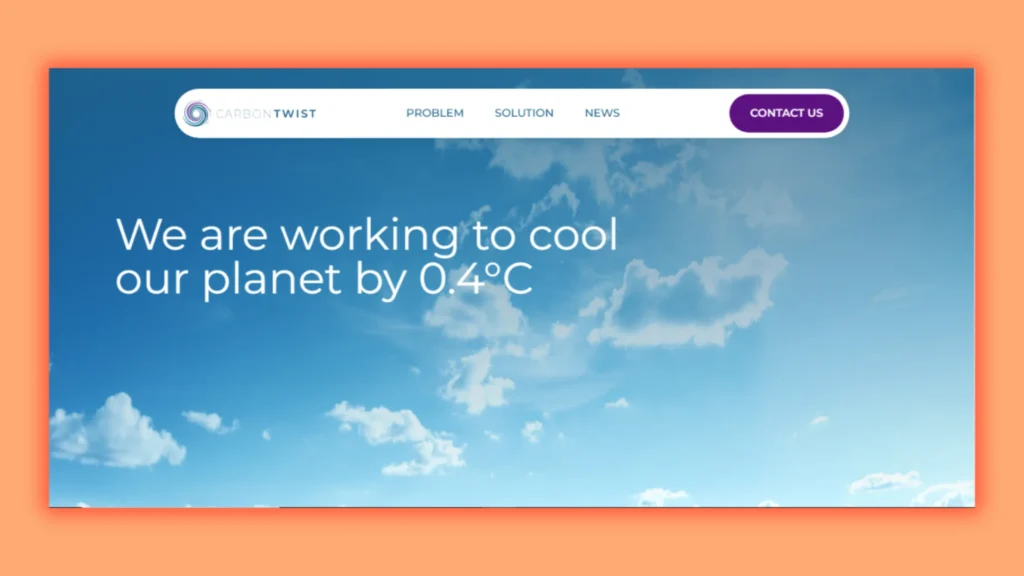
Israeli start-up, Carbon Twist is finding solutions to Global warming by neutralizing methane a key driver of global warming.
The startup’s catalytic process addresses methane sourced from cow sheds, gas leaks and releases, coal mines, and even landfills.
For example, a compact device mounted on cow sheds in livestock draws air, disassembles methane, and then releases back its byproducts while freshening up the interior of the cow sheds simultaneously.
This procedure eliminates methane and has better airflow than the preceding one.
It can ease the process of benefiting the produce without the farmer’s direct environmental input.
AIRMO
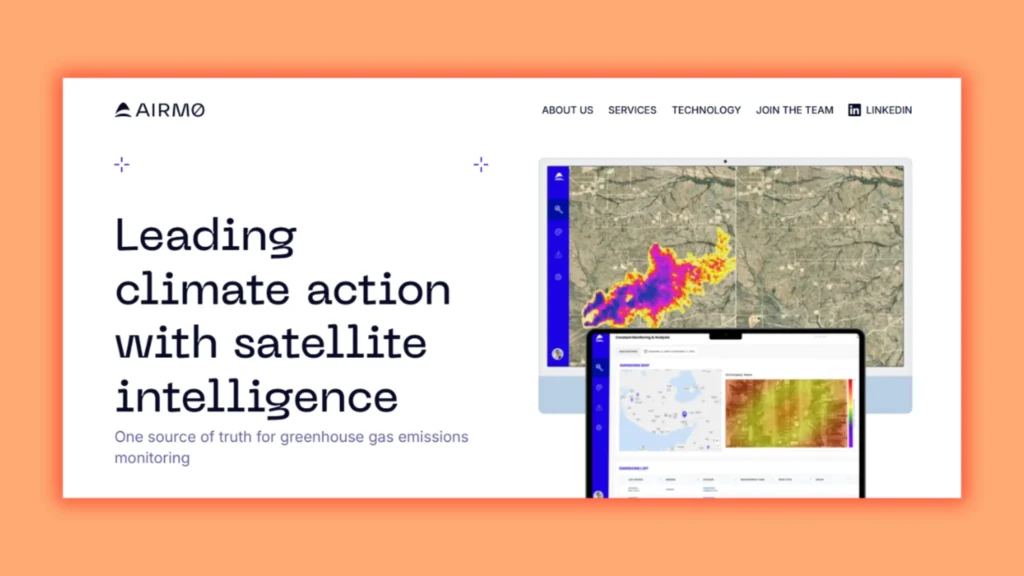
The German startup company AIRMO uses space technology-based information to track specific and consistent GHG emissions.
The technology has a satellite constellation with LiDAR and a spectrometer for near real-time global emissions measurement.
This micro-LiDAR solution also improves the accuracy and sensitivity of the detection of CO2 and CH4.
The development of satellite technology includes improved data acquisition in terms of quality and increased detail through AIRMO’s remote sensing and data analysis systems.
The startup can also monitor GHG emissions as needed and annually at specific sites.
Furthermore, it dispenses benchmarking services that allow clients to know which firms have the highest emissions ranking in their portfolio.
This climate tech startup also collaborates reported emissions with total emissions, KPIs, and over longer intervals.
AIRMO guides clients on which type and frequency of data to use to support risk assessment, management, and overall emissions reduction.
Green Sequest
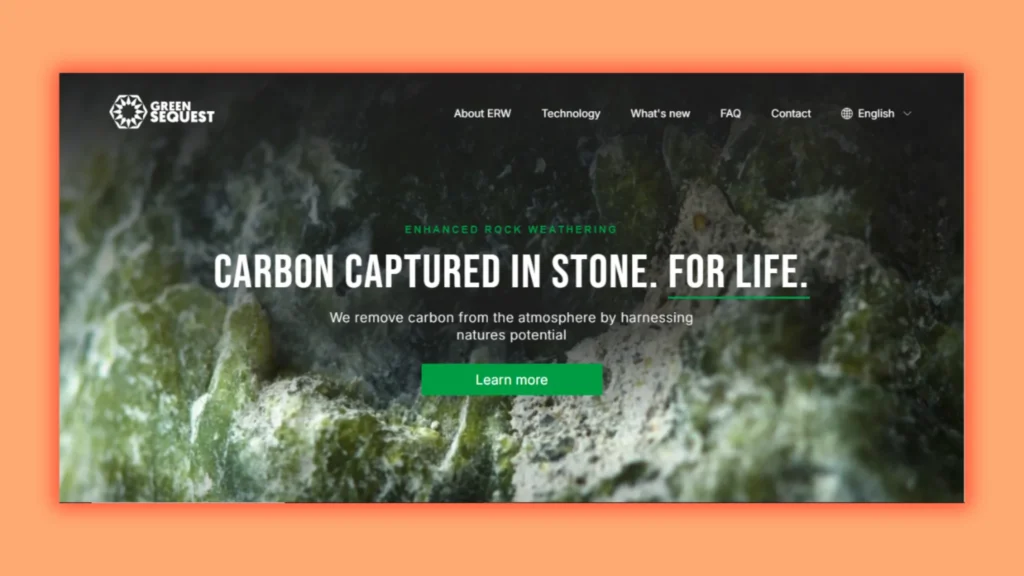
Green Sequest is a Polish startup that operates in carbon capture through technology based on ERW—the accelerated weathering of rocks by implementing a technology that immobilizes CO2 in rocks.
The startup cuts serpentinite to a fine granulometric class to increase the surface mineralization.
It also examines thermal activation and organic salts as a method to promote the process of natural mineralization.
Also, Green Sequest purifies and enhances serpentinite-derived mineral fertilizers that cultivate plants by sequestering carbon.
This climate tech startup quantifies, audits, and certifies carbon removal and intends to apply serpentinite in chimney filters to catch emissions on-site.
CCU International
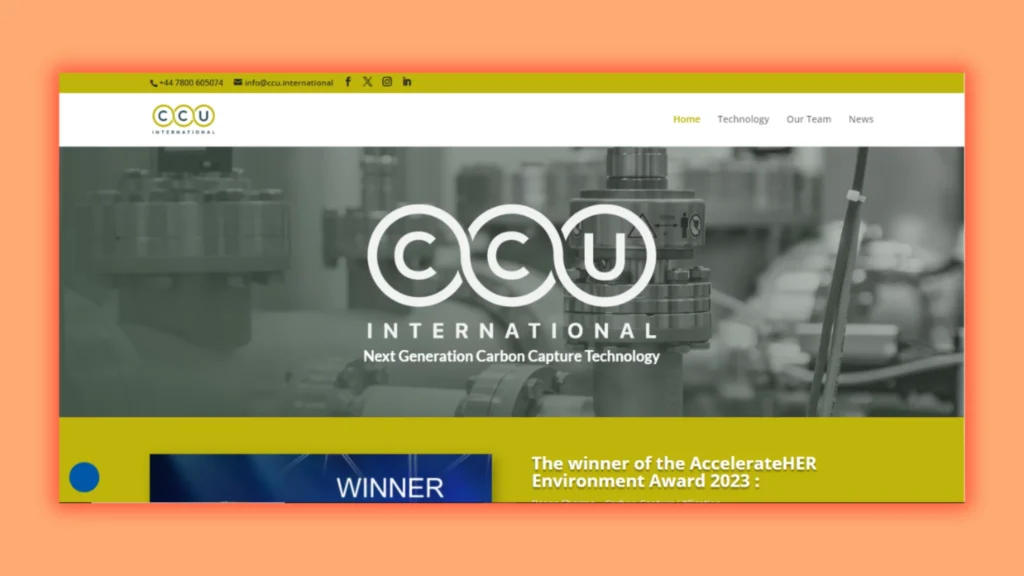
CCU International is a UK-based company that utilizes Carbon Capture and Utilization technology, providing the most effective technology for capturing CO2 from industrial emissions.
The startup’s current technology comprises several steps, including pressurizing the CO2 with the aid of silica gel, capturing and purifying the gas, and using it to produce other items such as plastics, concrete, and biofuels.
CCU International solutions, which stress low energy demands and intelligent control systems, apply to oil, the brewing sector, and anaerobic digestion.
CCU skills CO2 in a proper form and helps to mitigate global warming gas emissions and reduce greenhouse gases.
Humify
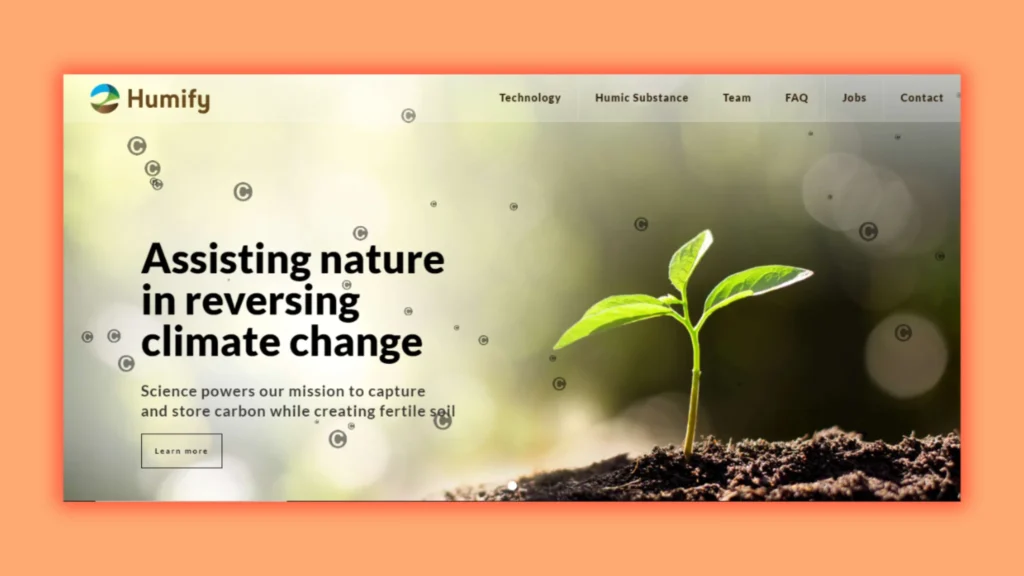
The Hydrothermal Humification Process by Germany’s Humify converts biomass to humic substances for carbon sequestration and abating soil depletion.
The whole process treats both wet and dry biomaterials. It supports large-scale production of humic substances in the form of carbon through a fast, continuous, and energy-efficient system with a closed carbon process.
This particular form imitates a common natural process whereby solid biomass carbon is transformed and fixed into hard coal without burning the biomass carbon, which, if burned, expels greenhouse gases.
The produced humic substances, which are essential for soil ecosystems, increase CO2 sequestration and soil fertility/water holding capacity.
These also control soil erosion, minimize the use of inputs from outside, and rebuild the soil’s microbial load.
Solarus Smart Energy Solutions
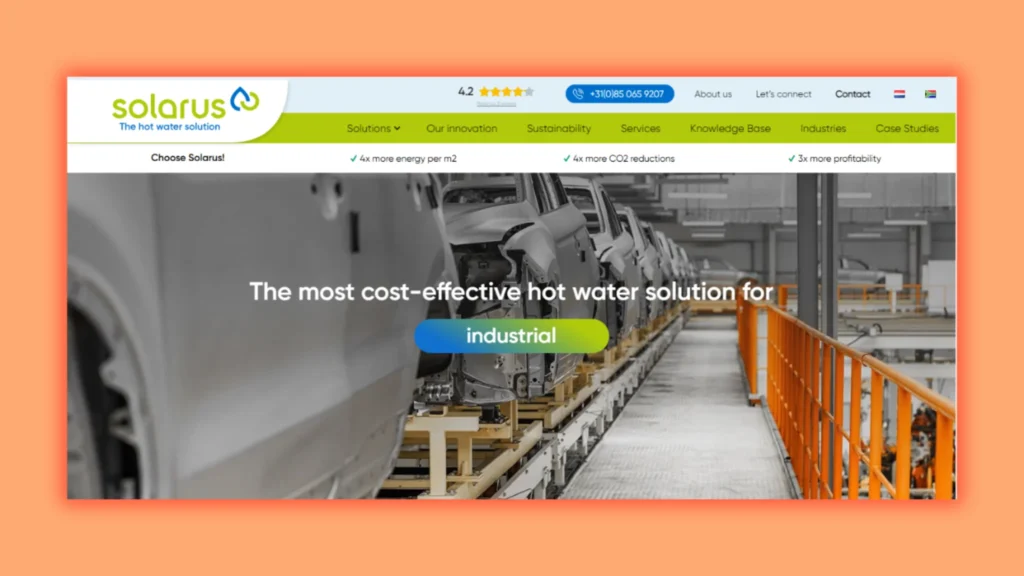
Solarus Smart Energy Solutions is a Dutch startup that uses solar energy to generate sustainable power solutions.
It utilizes solar photovoltaic (PV) technology to provide both thermal and electrical energy in a flexible systems approach.
This climate tech startup offers energy project development, equipment forecasting, asset management, and installation partner selection services.
It also offers engineering, procurement, and construction (EPC) contracting and solution installation services.
In addition, Solarus has developed custom software that functionally models the systems to give their clients realistic scenarios of power generation and a breakdown of actual costs.
Here is where Solarus comes in handy. It offers a package enabling a company to reduce its sustainable energy requirements to a single source.
eVegah
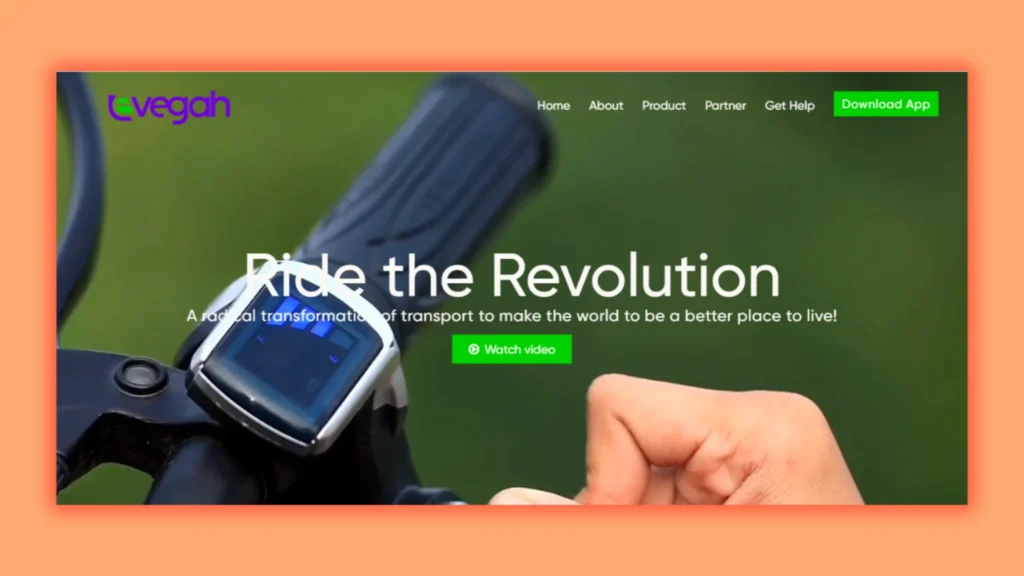
The Indian startup eVegah is building a market to match riders with green mobility providers safely.
The startup created an e-bike, eVegah, which flies equipped with a smart lock and can be rented through a mobile application.
To access the service, riders navigate to the nearest car via the app, scan a code, and pay to unlock it.
Thus, this climate tech startup minimizes the use of personal cars for First—and Second-Mile mobility needs and has vehicle placement and management modules.
It also improves the accessibility of the last mile and reduces CO2 emission rates and traffic jams.
Liminalytics
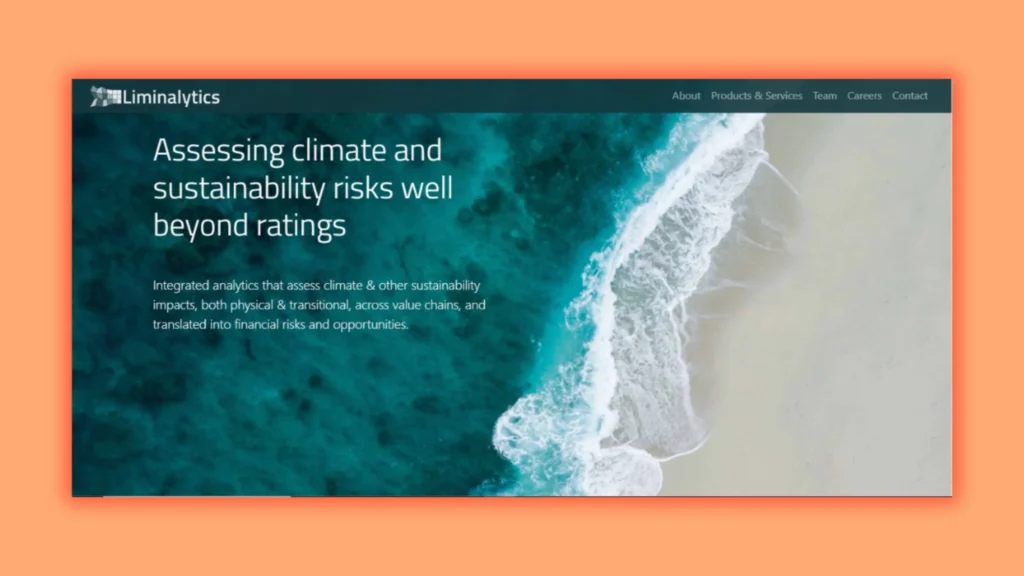
The German startup Liminalytics builds an all-in-one analytics solution for evaluating climate and sustainability effects for risk and return predictions.
The tool employs sophisticated models, superior-quality datasets, and an intuitive user interface to aid banks in assessing climate and sustainable risks.
It also provides financed greenhouse gas (GHG) emissions estimates, climate vulnerability assessments, transition risk assessments, and sustainability risk assessments.
Portfolio analysis can be done at the sector level, where actionable insights for TCFD, EBA, and taxonomy reporting can be found.
Consequently, Liminalytics rationalizes the treatment of credit risk portfolios in banks and contributes to building a sustainable future.
CHLYDRO
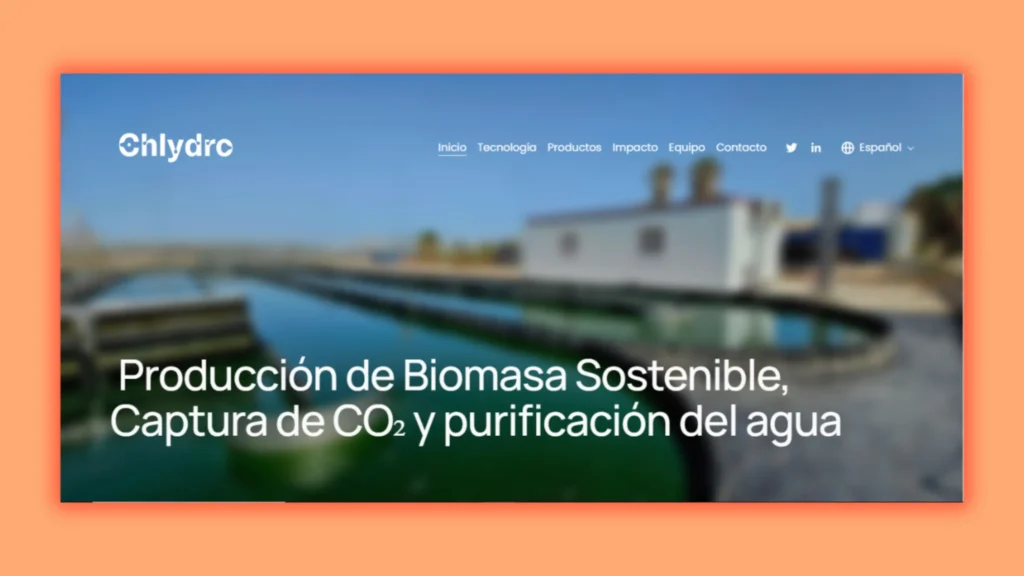
Climate change is fought by using aquatic plants and microalgae by Spanish startup CHLYDRO.
These photosynthetic organisms fix sunlight, CO2, and water to oxygen and nutrient-dense organic compounds.
This biomass is used as input for green products like biofertilizers for agriculture and biogas for energy.
CHLYDRO provides a flexible solution that enables the measurement of daily tons of CO2 to minimize carbonization impact.
Its solution is also renewable since this climate tech startup uses solar power to support its operations.
Cetogenix

Cetogenix is a New Zealand-based start-up that provides solutions to minimize climate changes around the globe.
Its technology employs hydrothermal oxidation and fermentation to transform refractory waste streams into essential elements.
These components are turned into feedstock for biological conversion into clean energy and bioproducts.
The startup’s product, Ceto-Boost, targets the anaerobic digestion market segment, which is developing year by year and increasing gas production.
It also enables the eradication of additional sources of waste. Eliminating extra resources of waste contributes to saving overall time.
Thus, Cetogenix enhanced the performance of WTE solutions and allowed service providers to accelerate the decarbonization goals.
Dedalo AI

Italian startup Dedalo AI empowers information technology (IT) organizations to track and reduce the CO2 emissions caused by their software.
It provides an accurate means of measuring the energy consumption of the end device for a given software.
For this, it uses AI algorithms for static analysis for any device, conventional power, and CPU consumption of software.
This climate tech startup imports customer web analytics data, and then the algorithm estimates the energy consumption and carbon intensity in the device’s particular zone.
Dedalo AI produces an ESG-compliance-loving carbon report that the firms use to enhance their transparency and ESG rating.
Plankton Marine Technologies
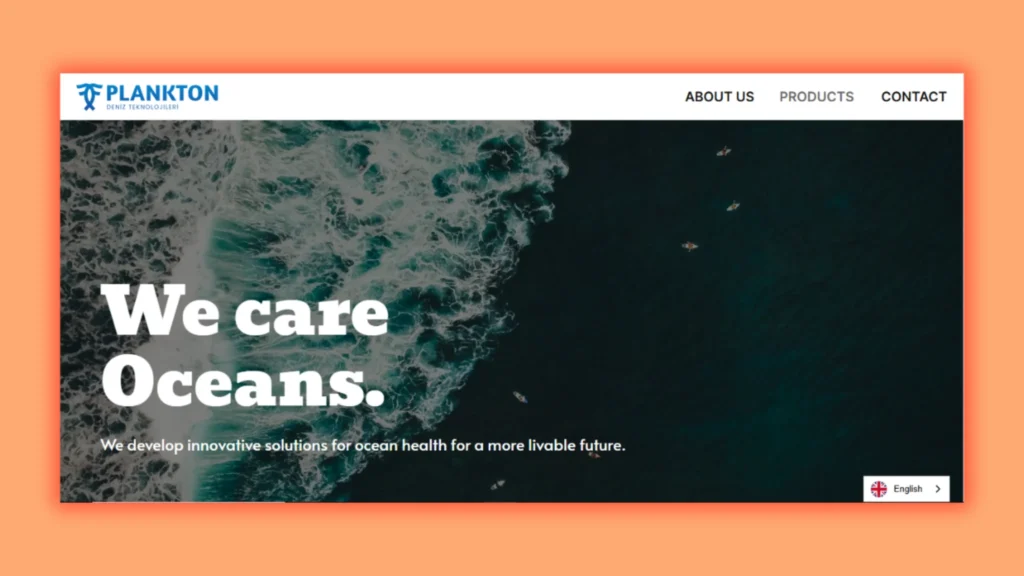
Plankton Marine Technologies – A Turkish-based startup unveils Plankton, an underwater waste collector.
It uses a technique and structure to harvest open-loop wastes that flow in water resources.
The device is mounted on a wall or pier to have a black hole impact on the sea surface and allow the collection of both liquid and solid wastes.
Plankton also has DataTakers to capture data about water quality and the fill status of waste bins – such data is valuable.
Therefore, dealing with organizations such as Plankton Marine Technologies can reduce pollution and increase water quality and the general health of oceans.
QD-SOL
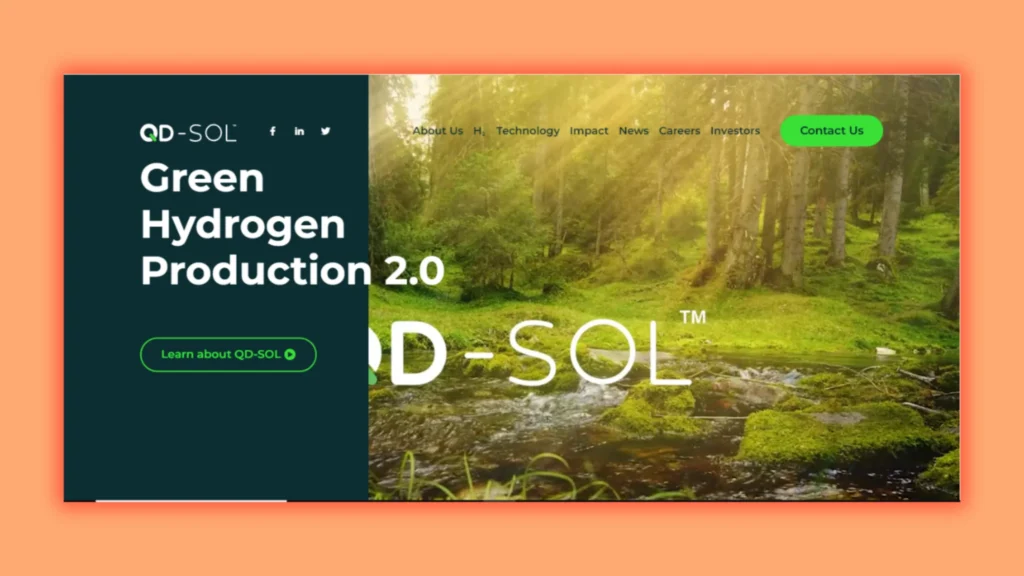
Israeli start-up QD SOL uses nanotechnology to produce quantum green hydrogen.
Its technology exploits nanoparticles that facilitate separation from water, eliminating the need for expensive hydrogen-generating photovoltaic panels or wind turbines.
Regarding cost, QD-SOL’s quantum green hydrogen makes it cheaper in terms of the energy scales it develops, and it is environmentally friendly since it does not emit pollutants.
The former assists in meeting the industrial energy demand, and the latter counters the problem of fossil fuel-based hydrogen generation.
Kausal

Finnish startup Kausal provides a Kausal Watch application that helps cities manage, monitor, evaluate, and share climate-related projects.
It presents an overview of climate plans, allows users to categorize actions freely and creatively, and offers a lot of detail.
This climate tech startup allows environmental managers, sustainability officers, and corporate employees to actualize agendas into actionable steps.
Real-time tracking works hand in hand with progress.
Kausal Watch captures information primarily for intramural and extramural information sharing and enables the transition from reactive to preventive climate management.
Verdoo

Verdoo from Denmark enables online customers to reduce their carbon emissions by searching for numerous shopping coupons in over 10,000 online shops.
This climate tech startup achieves this by developing a browser extension as a recommendation engine.
The shoppers then sign up for Vertoo and install the Vertoo extension that works in Google Chrome and Mozilla Firefox.
Verdoo allows a certain portion of each shopper’s transaction to fund global reforestation, with the funds taken from the transaction’s purchase price.
This helps shoppers reduce carbon emissions during shopping and enjoy the benefits of cheaper prices when shopping online.
Final Thoughts to Climate Tech Startups
We have summarised the top 20 climate tech startups in 2025 to look upon, by the end of this informative article, you now know how exactly big climate tech startups work.
If you are intrigued enough to start your own, go ahead. Reliable Startup is here to suggest the best tips for your idea if you are confused.
Want to know more about business ideas? check out our other tech startup ideas blogs for starting your own.




